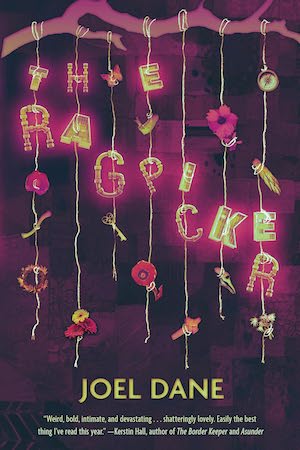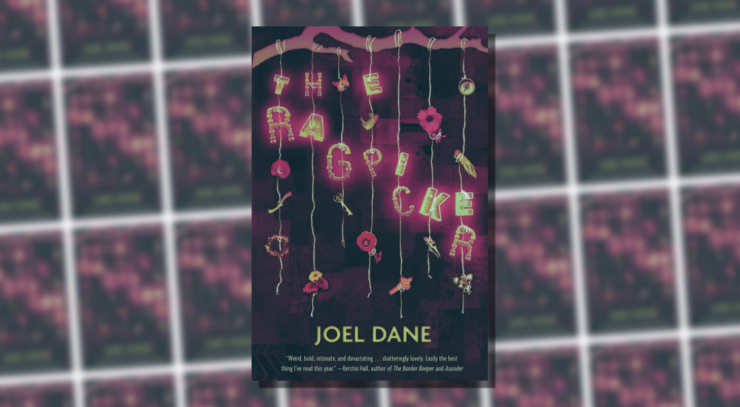Many books preach the power of kindness, but few treat it as radical. Fewer still embody it in the guise of a half-mad drifter trapped inside a souped-up VR bodysuit, travelling through a lush post-apocalyptic land while haunted by a motley assortment of digitalised people—including his dead mother and husband.
Welcome to The Ragpicker. It might just be the best book you read this year. It will certainly be amongst the weirdest.
In some respects, it’s much easier to write about books you dislike than those you cherish, and I’m trying to avoid sounding inane, but Joel Dane’s latest novel is just… annoyingly excellent. Although it may be an acquired taste, I loved it fiercely, and have been on a singular mission to foist it on everyone in my immediate vicinity. (Hence, incidentally, this article.)
It’s got a band of serial killers called ‘likehunters.’
Okay, so imagine inescapable Google Glass, but, like, worse.
There’s a One Act Play in the middle! Just for fun!
The problem with books that delve into the Power of KindnessTM is that, more often than not, they end up actually delving into the Power of Saccharinity. Not so with The Ragpicker. This is not a ‘nice’ book. It is, in fact, occasionally astonishingly violent. But for all that it is clear-sighted in the face of horror and ugliness, it remains passionately optimistic regarding the potential of unorthodox relationships and connections. It revels in humanity’s capacity for tenderness, especially towards that which is broken and fragile.
Buy the Book


The Ragpicker
This shows up in the very premise of the worldbuilding. The Ragpicker takes place over a hundred years after a golden age of hyperconnectivity—it’s set, effectively, in the wake of a social media apocalypse. The satellites are failing, and the bulk of the once glittering digital realm now hangs over the land like the corpse of history. Sundered from the virtual powers that had formerly sustained them, the majority of humanity is implied to have died swiftly in “an easy departure,” still rapturously immersed in their reciprocal connectivity.
Not everyone died, however, and an aspect of the novel’s defiant optimism shines in its absolute refusal to depict societal collapse in the style of Hollywood disaster movies—that is, as a violent, individualist fight for resources, survival of the fittest, every man for himself, overrun with cockroaches, etc. etc. “We expected, with the easy cynicism of people unacquainted with hardship, that the survivors of the apocalypse would descend into savagery,” one of the characters acknowledges. Instead:
“I remember the unruly mobs of survivors, grieving and anguished and outcast from the world they loved… shambling packs of half-starved, half-mad hominids who obeyed as if a single animal the compulsion to make any sacrifice to save one other… to feed the hungry, to soothe the injured, to ease the dying. To wrap each other in the warmth of yourselves.”
It is this defiance in the face of adversity that marks the whole novel: a bloody-minded refusal to cede ground to cynicism. In another story, such earnestness might feel naïve or unearned, but Dane takes pains to never evade or sugar-coat the horrors of his world, or to suggest that people aren’t still fallible and cruel—and it’s precisely that contrast that lends the work its power.
Enter the eponymous Ragpicker. Thanks to his pre-collapse secondskin bodysuit, he has survived over a century of roving through the flourishing wilderness on his own. He has, by this point, largely lost the ability to verbally communicate—the deteriorating virtual personification of his dead husband, Nufar, says that he is “cognitively compromised,” but the Ragpicker prefers “characterologically adapted” to staying alive.
At the start of the novel, he is travelling back homeward in the hopes of uploading Nufar to external physical storage, thereby restoring the ‘obit’ and protecting him from any further data loss. En route, however, he is waylaid—first by a bear, and then by a teenage girl named Ysmany who needs him to help her save a baby.
The narrative alternates between the Ragpicker and Ysmany’s perspectives, both of which serve as a masterclass in voice-based characterisation. Where the Ragpicker’s sections are rambling, tangential, marked by unexpected and suggestive fractures in sentences, and internal arguments between the dead digital voices haunting him, Ysmany’s sections are direct, specific, and organised into brief ligaments of narrative. Motherless, she lives in a village protected by another cognitively compromised person in a skinsuit—this one named Server. Ysmany’s role is to assist Server in building and maintaining the lampstack: an arcane collection of thousands of significant but random objects that are braided into cords and strung up throughout the village.
It’s a role to which Ysmany is uniquely suited, and one that grants her a certain degree of status, although it also sets her apart from her community. The novel reflects both the structure of the lampstack and Ysmany’s way-of-seeing through the arrangement of the text on the page, with each block of text serving as nodes in a string—because Ysmany is actually engaged in the impossible task of recreating the structure of the lost internet through physical media.
Bird skulls, nails, lost teeth, cellophane, ballpoint pens, lipstick tubes… and most recently, body parts from the people Server has murdered.
Ysmany fears an orphaned baby boy named VK might be Server’s next victim. When she learns that the Ragpicker is passing through the area, she sees an opportunity to save the child, and perhaps reunite him with his extended family. She is woefully unprepared to survive on her own, let alone act as a surrogate parent to a screaming infant, but she is resolved to try. “We’ll find a new momma!” she says, and then must amend: “for you… a new momma for you.”
Ysmany and the Ragpicker’s lonelinesses take different shapes, forming distorted reflections of the same pain—a dislocation emblematic in the world itself. Everything is fragmented in the fall of connection, and the novel is constantly navigating the tension between the perils of complete union and assimilation (as personified by insidious groups of serial killers who stage bloody carnage, apparently for the appreciation of an absent, long-dead audience—literal hunters for ‘likes’) and those of complete discreteness (as seen in Server, who regards fragmentation as “a prerequisite of survival,” and ruthlessly eliminates any threats to this vision.) Characters both ache for connection, and fear it. Ysmany and the Ragpicker come to recognise in each other the same broken human need, and through that recognition form a wary sort of harmony—something that weaves between the poles of collectivism and individualism, something specific, intimate, and unsentimental.
In strange ways, they seem better able to understand each other than themselves—the Ragpicker is terrified by his potential capacity for violence even as he sews menstrual pads for Ysmany and changes VK’s diapers and collects postcards. Ysmany regards herself as “a nasty little spider” in the web of the lampstack, inhuman and lacking in some ineffable way, even as she continually makes self-effacing choices for the benefit of others. And it is not that the Ragpicker isn’t violent, and Ysmany can’t be mean, but that the narrative continually, gently, insistently refutes their worst opinions of themselves in ways which are profoundly touching.
Although The Ragpicker is a daring, intelligent, and somewhat batshit book, I feel this kindness is what truly sets it apart. It is hilarious and incisive, and contains one of the most gut-wrenching narrative twists I have ever encountered, but, in the end, the singing depth of its humanity is what truly continues to linger with me. It contends that you cannot go back to who you have been—you can only become more.
The Ragpicker is published by Meerkat Press.










